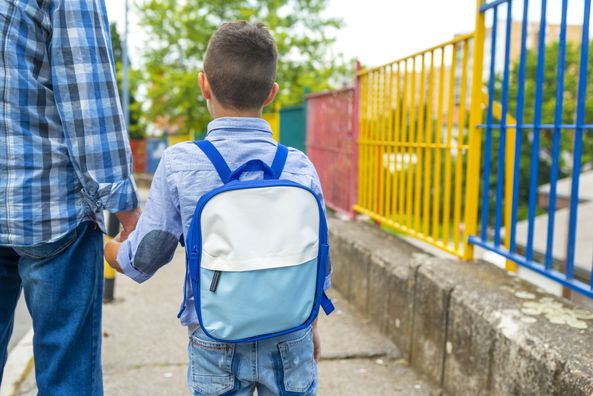This National Suicide Prevention Week, Elizabeth Kurian, DO, Behavioral & Mental Health, Psychiatry, shares details on the triggers and warning signs of potential suicidal behavior in children as well as the influence the internet and social media have on suicidal behavior, and steps parents or loved ones can take to discuss suicide with their children.
If you or a loved one is experiencing thoughts of suicide, a mental health or substance abuse crisis or any other kind of emotional distress, call a mental health professional or the National Suicide Prevention Lifeline at 988.
According to Psychiatry.org, fifty percent of mental illness begins by age 14 and seventy-five percent begins by age 24. Can you explain this age of onset?
Dr. Kurian: Anxiety disorders are the most common psychiatric illnesses that occur in the population and are also the ones that present at the earliest age. Other diagnoses such as Autism and ADHD also begin at a very young age. Anxiety disorders present in a timeline that makes sense with typical developmental stages: first with separation anxiety in young children, then generalized anxiety in adolescents, and then social anxiety in teenagers.
Suicide is a leading cause of death in children. With depression or other mental health concerns possibly disguising themselves in “typical teenage” behaviors, what are some of the biggest warning signs that a child may be depressed?
Dr. Kurian: Some moodiness, irritability, and pushing away from parents as teenagers try to establish themselves as individuals is a normal part of “typical teenage development.”
The following would be warning signs of depression:
- isolating from both family and friends
- poor school attendance (drop from their previous achievement status)
- loss of interest in things they previously enjoyed
- changes in appetite or sleeping patterns
- increased use of drugs or alcohol
- anger outbursts
- signs or statements of hopelessness
Evidence suggests that the internet and social media can influence suicide-related behavior. What do you contribute to this correlation?
Dr. Kurian: Some stressors that occur online today include an increased likelihood of exposure to cyber-bullying and 24⁄7 round-the-clock information to people who can potentially be mean or disheartening. There is also more potential exposure to graphic content which can cause desensitization to certain subjects, as well as glorify some aspects of suicide — giving children and teenagers a false sense that suicide can solve their problems.
How can parents or loved ones talk to kids about their social media presence and be aware of warning signs there may be a bigger problem?
Dr. Kurian: At the beginning of giving your children access to the internet and social media, provide consistent education on internet safety and educate them on setting clear boundaries and expectations regarding their online access.
Some warning signs of a bigger problem may be excessive use of screen time, lack of trying to connect with family or friends “in real life (IRL),” and low mood or self-esteem.
How can parents talk with their kids about death by suicide when it occurs in their circle?
Dr. Kurian: The most important thing parents can do is be there for their children. Regularly ask them how they are doing using open-ended questions. Avoid jumping in to “fix things,” offer solutions or react with judgment. Rather, listen and validate their feelings, and follow their lead as to how you can support them. Follow back up often about their feelings, how they are doing and if they need additional support.
If a parent or loved one suspects a child may need mental health support, what is the first step?
Dr. Kurian: Talk with your child and understand how they are doing. Then, reach out to their primary care physician and school counselors, who can offer advice, support, and referrals for more specialized care.
If they are experiencing thoughts of suicide, a mental health or substance abuse crisis or any other kind of urgent emotional distress, the National Suicide Prevention Lifeline is available all day, every day at 988.
The Duly Health and Care team is here to support you and your family through any difficult journey. Schedule a visit with your primary care provider or learn more about our behavioral and mental health services today.
Health Topics:








